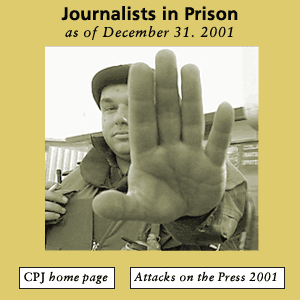CPJ confirms detention of 14th journalist
New York, August 6, 2002—The Committee to Protect Journalists (CPJ) today confirmed that Eritrean journalist Simret Seyoum, a writer and general manager at the banned private weekly Setit, has been in Eritrean government custody since early January. This puts the total of jailed Eritrean journalists at 14, although government sources recently acknowledged holding only “about…
GOVERNMENT ADMITS TO CPJ THAT IT IS HOLDING JOURNALISTS IN SECRET DETENTION
New York, August 2, 2002—During a recent fact-finding mission to Eritrea, a presidential official told a delegation from the Committee to Protect Journalists (CPJ) that eight independent journalists are currently imprisoned and held incommunicado. Although the official, presidential spokesperson Yermane Gebremesken, cited eight journalists, CPJ puts the total number of journalists jailed in Eritrea at…
Jailed journalists moved to undisclosed location
Your Excellency: The Committee to Protect Journalists (CPJ) is gravely concerned about the safety of 13 Eritrean journalists currently in the custody of your government. The journalists have not been charged with any crime since their September 2001 arrests. On March 31, 10 of the jailed journalists began a hunger strike to protest their unfair imprisonment. In a message smuggled out of Asmara Police Station One, where they are being detained, the journalists said they would refuse food until they were either released or charged and given a fair trial.
Jailed journalists on hunger strike
New York, April 3, 2002—Ten independent Eritrean journalists who have been jailed without charge since September began a hunger strike on March 31 to protest their continued detention, according to local and international sources. In a message smuggled from inside the Police Station One detention center in the capital, Asmara, the journalists said they would…
Attacks on the Press 2001: Introduction
IN THE WAKE of September 11, 2001, journalists around the world faced a press freedom crisis that was truly global in scope. In the first days and weeks after the terrorist attacks on New York City and Washington, D.C., governments across the globe–in China, Benin, the Palestinian Authority Territories, and the United States–took actions to…
Attacks on the Press 2001: Africa Analysis
Silence reigned supreme in Eritrea, where the entire independent press was under a government ban and 11 journalists languished in jail at year’s end. Clamorous, deadly power struggles raged in Zimbabwe over land and access to information, and in Burundi over ethnicity and control of state resources. South Africa, Senegal, and Benin remained relatively liberal…

Attacks on the Press 2001: Journalists in Prison
There were 118 journalists in prison around the world at the end of 2001 who were jailed for practicing their profession. The number is up significantly from the previous year, when 81 journalists were in jail, and represents a return to the level of 1998, when 118 were also imprisoned.
Government tightens noose on independent press
Your Excellency: The Committee to Protect Journalists (CPJ) is deeply troubled by your government’s ongoing crackdown on the independent press in Eritrea. According to our research, all the country’s independent newspapers have now been shut down. Eleven journalists are currently jailed without charges, while the whereabouts of three others are unknown.
Nine journalists arrested; two others flee as crackdown continues
New York, September 25, 2001—Eritrean security forces have arrested at least nine journalists over the last few days, sources in the capital, Asmara, told CPJ. The arrests came less than a week after authorities abruptly closed all privately owned newspapers, allegedly to safeguard national unity in the face of growing political turmoil in the tiny…